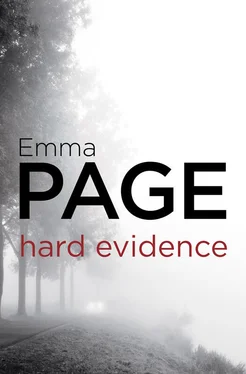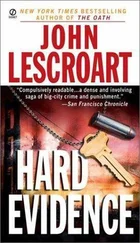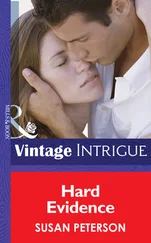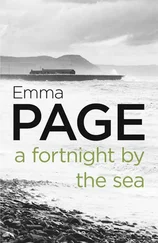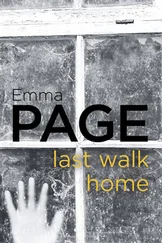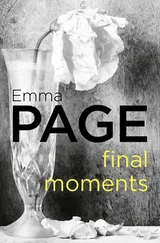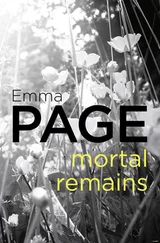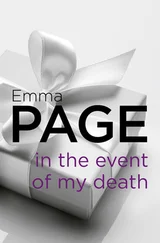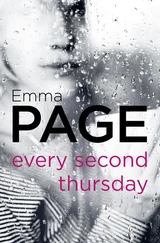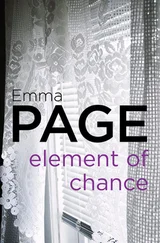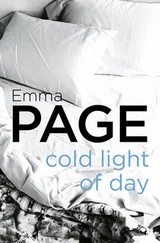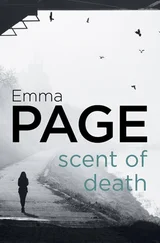She halted, reached into her holdall and drew the jacket from its wrappings. ‘It was marked down quite a bit. It seems a terrific bargain to me. I can’t see anything wrong with it.’
She held it up against her. An expensive-looking garment, fashionably cut; fine, smooth cloth in a muted grey-green check. ‘Do you like it?’ she asked. ‘Do you think it suits me? It goes with all my things.’
Neither of the other two responded to any of this with so much as a smile or a glance at the jacket. Fielding got to his feet and Julie’s stream of chatter fell away.
‘We need to talk,’ Fielding told her brusquely. ‘We’ll go inside.’ Without another word or look he went into the house.
Julie stood irresolute. She turned her head as if about to make a run for it, then she gave her shoulders a little shake and followed him with an air of compliant meekness.
But the look in her eyes as she stepped across the threshold was far from compliant.
Audrey sat gazing after them with an expressionless face, then she stood up and went limping over to a bed of daffodils. Here and there she nipped off a faded bloom, to be cast down later onto the compost heap.
CHAPTER 2
Rain began to fall early on Friday morning, dying away by eleven. It was almost noon as Detective Sergeant Lambert drove back to Cannonbridge. His inquiries had taken him to a couple of outlying villages where he had spent a fruitless morning chasing shadows. He felt tired and irritable, hungry and thirsty.
The sun shone down from a clearing sky. His route took him along minor roads little more than lanes, between flowering hedgerows, grassy banks starred with primroses, past orchards of pear trees snowy with blossom. His sour mood began to evaporate.
When he was still some half-dozen miles from Cannonbridge he rounded a bend and saw on the grass verge, a short distance ahead, a white Mini, standing sideways on to him, its back wheels sunk in the ditch. As he came up it became clear that the rear bumper had got itself hooked under a boulder, one of several strewn along the verge, which had fallen from the crumbling stone wall backing the ditch.
A girl crouched beside the vehicle, trying to free the bumper. She got to her feet as Lambert pulled up close by. He ran an appreciative eye over her. A pretty girl with strikingly beautiful brown hair glinting in the sunlight. She was trimly dressed in a dark green skirt, a smartly cut jacket in a muted grey-green check.
She was delighted at his offer of help. ‘I overshot the turning,’ she explained. ‘I was reversing and I skidded back into the ditch.’ She gestured over to the right. ‘I’m going to Calcott House.’ She saw the name meant nothing to him. ‘It’s a hotel,’ she added. ‘Quite near here.’
He got her to move aside the stone as he eased up the rear of the car. The end of the bumper was twisted and dented. ‘It’s no great damage,’ he assured her. ‘It won’t cost a fortune to put right.’ She thanked him profusely for his assistance.
‘This hotel you’re going to,’ he said. ‘Do they serve lunch to nonresidents?’ The notion of a decent meal in civilized surroundings appeared distinctly cheering. Particularly with the chance of a pretty girl to share his table.
‘I think they do,’ she told him. ‘I haven’t stayed there before. I used to live round here, in Calcott village, but I left three years ago. This is the first time I’ve been back – I’ve no family here any more. Calcott House used to be just a residential hotel but there were changes a few years ago; they did a lot to the place. I think maybe it changed hands at that time but I can’t quite remember. Anyway, they started doing bed and breakfast, catering for holiday-makers. I’m pretty certain they began doing meals for nonresidents at the same time.’ She gave him a friendly smile. ‘I’m sure they’ll give you lunch.’
He followed her Mini till they came in sight of tall wroughtiron gates standing open to a long drive flanked by flowering shrubs, running up to a large Victorian house framed by mature trees. A board by the gate assured him the hotel did indeed serve lunch and dinner to nonresidents.
In the car park the girl suggested it was time they exchanged names; hers was Julie Dawson. She wore an air of pleased expectancy as they walked across to the pillared entrance. ‘I always longed to come here when I was a child,’ she confided. ‘It seemed a mysterious, romantic place. But I never even set foot in the grounds. I used to make up stories about it. I used to tell myself: “One day, when I’m grown up, I’ll go and stay there.” I imagined that would be about as far as anyone could get in the high life.’
She gave him a grin, like an excited child. ‘Now here I am, walking in through the doors. I decided to come this weekend on the spur of the moment. I rang up and found they could take me. I was delighted.’
He waited for her in the lounge bar while she checked in. When she rejoined him he asked what she would like to drink.
She looked at his glass. ‘What’s that you’ve got?’
Nonalcoholic lager, he told her. She shot him a surprised, amused glance. ‘I still have to drive,’ he pointed out. ‘Unlike you.’ After a moment’s hesitation he added, ‘I’m a policeman. I’m on my way back to the station in Cannonbridge.’ He waited for the friendly expression to vanish from her face, for a look of cool wariness to succeed it.
But she leaned forward with an air of eager interest. She ran her eye over his dark suit, his white shirt. ‘Are you by any chance a detective?’ she asked. He admitted that he was. ‘I’m a detective sergeant, to be precise.’
She clapped her hands and gave him a gleeful smile. ‘How marvellous! I’ve never met a real-life detective before – I’ve never met any kind of policeman on a social level. I’ve always loved reading detective novels.’
‘I’m afraid it’s not always like it is in the books.’ He changed the subject without subtlety; he had no intention of spending the next hour talking about his job.
When she had finished her drink she suggested an inspection of the garden; there was plenty of time before lunch. They went out into the bright sunshine. The grounds were of considerable size and had clearly been laid out with much care at the time the house was built. They strolled past lawns, shrubberies, rockeries in full springtime splendour of pink and mauve, yellow and white. A dolphin fountain jetted cascades of diamond drops into the sparkling air; purple irises bloomed beside a pool. They followed a woodland walk through dappled green shade under an arching canopy of branches. The ground was carpeted with bluebells, forget-me-nots, violets, anemones. A relaxing air of peace and tranquillity brooded over the whole.
They wandered back towards the house and came upon a series of small individual gardens enclosed by formal hedges of clipped evergreens, each garden designed round a different theme. One had been entirely devoted to aromatic foliage plants in shades of silvery grey. Julie asked Lambert if he knew what the plants were. He had to admit he didn’t.
On a stone bench a few feet away a woman sat leaning back with her eyes closed. Beside her on the seat lay a folded newspaper and a spectacles case. At the sound of their voices she opened her eyes and sat up. She looked across at them and after a moment got to her feet and came over. A stocky woman, mid-fifties, with a vigorous appearance. Blunt features; short, iron-grey hair taken to one side and secured with a plain brown slide. No make-up; a scrubbed, clinically clean look. She wore a dark grey, chalk-striped suit tailored on lines of uncompromising severity.
With the briefest preamble of an apology for breaking in on them she began to identify the various plants for Julie, who listened with appreciative interest. A lonely woman, Lambert judged, snatching at any chance of conversation. As she gestured at the plants he saw that her stubby hands were bare of rings.
Читать дальше
